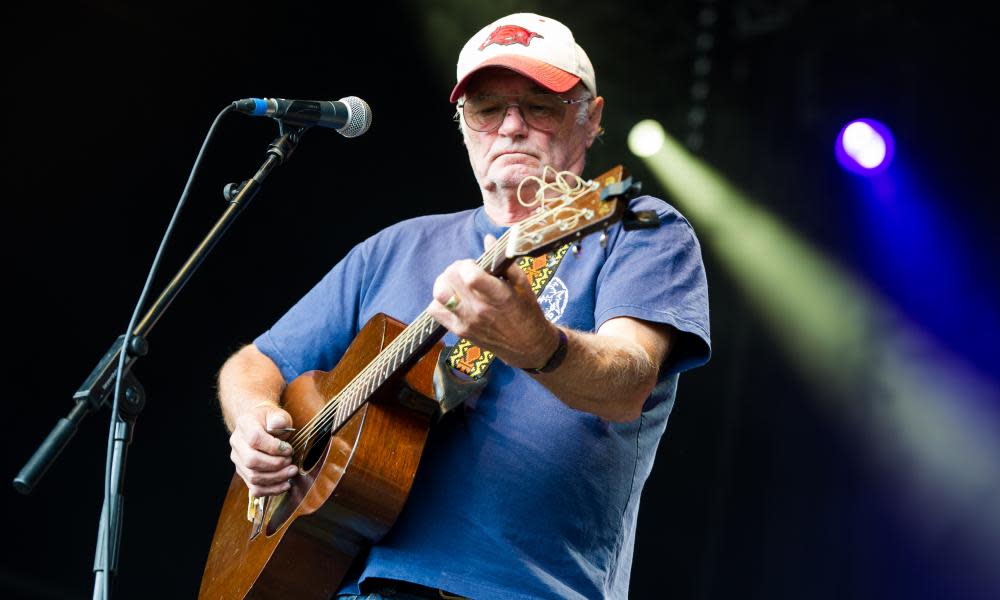Michael Chapman: British folk musician dies aged 80

The British guitarist Michael Chapman has died at the age of 80. In a post to Instagram announcing the news, no cause of death was given, but it was stated that Chapman died at home.
“Please raise a glass or two to a gentleman, a musician, a husband, a force of nature, a legend and the most fully qualified survivor,” his family wrote.
Related: Michael Chapman: the man who connects Elton, Bowie, Nick Drake and Sonic Youth
Yo La Tengo, BBC Radio 6 Music DJ Marc Riley, guitarists Chris Forsyth and Ryley Walker and broadcaster Danny Baker were among those to pay tribute to Chapman, who moved between folk, roots music, acoustic and noise, and instrumental and sung, throughout his venerable career.
Paradise of Bachelors, which released Chapman’s two final studio albums, called him “a hero and friend to so many, including us, moving with unmatched grace, vigour and gruff humour within and beyond his songs and those he inspired from others.”
Chapman was born in Hunslet, Leeds, on 24 October 1941. He studied and later taught photography and life drawing, all the while playing jazz and skiffle, citing Lonnie Donegan, Django Reinhardt and Big Bill Broonzy as influences. It led to a falling out with his parents, who wanted him to work in the same steelyard as his father. “But playing the guitar paid for my education,” he told Sonic Youth’s Thurston Moore in 2009.
A trip to Cornwall in 1967 started his career in earnest. “I had an art college education and on a rainy night in 1966 I went into a pub in Cornwall but I couldn’t afford to pay to go in,” he once recalled. “I said, tell you what, I don’t want to stay outside in the rain, I’ll play guitar for half an hour. I’ve been at it ever since.”
Chapman released his debut album, Rainmaker, on the famed hippie label Harvest in 1969. A reissue on the label Light in the Attic called Chapman “a true stylist in his own right” and said he “holds a middle line between John Martyn and Bert Jansch with the provocative electric rock of Martyn juxtaposed against the traditional folk so wonderfully espoused by Jansch”. It was the first of three albums he recorded with Gus Dudgeon.
He was pigeonholed as part of the new London folk scene despite never living there: “It was a very southern thing and I’m strictly a northern person,” he told Aquarium Drunkard in 2016. “I stayed up in Hull. It was at least 75% cheaper to live in Hull than London and I’m a Yorkshire man – I don’t waste money.”
The album appealed to Elton John, who indirectly appeared to ask Chapman to join the band that would play on his self-titled 1970 album – not that Chapman realised it at the time.
For his next album, 1970’s Fully Qualified Survivor, Chapman asked Hull guitarist Mick Ronson to perform with him. He appeared on the record but wouldn’t leave his band, the Rats, to tour; David Bowie soon appropriated the Rats as his own live band.
“He sacked the singer and turned him into a roadie and Trevor and Woody and the Rats became the Spiders from Mars and some people think they got a bit better,” Chapman told Aquarium Drunkard. “I’m not of that opinion, but there you go.”
He continued to release prolifically throughout the 70s – an era partly influenced by time spent in Memphis, where he made the album Savage Amusement with the producer Don Nix – and 80s, until a heart attack in 1990 stalled Chapman’s career. “Everyone forgot about me,” he told the Guardian in 2017. That was, until Sonic Youth attended a gig he played in Massachusetts in 1998, leading to a correspondence with frontman Thurston Moore.
A period of rediscovery by other artists followed, including the late Virginia guitarist Jack Rose and the No Neck Blues Band, which inspired Chapman’s late-career foray into noise with 2011’s The Resurrection and the Revenge of Clayton Peacock. A compilation tribute album, Oh Michael, Look What You’ve Done, saw his work covered by artists including Lucinda Williams, Meg Baird, Hiss Golden Messenger, Bridget St John and William Tyler.
He also found a peer in Pennsylvania guitarist Steve Gunn, who recorded two of Chapman’s acclaimed, latterday albums, the 2017 return-to-form 50, and True North from 2019, and toured with artists including Moore, Kurt Vile and Bonnie Prince Billie.
In the interview with Aquarium Drunkard, journalist Jason Woodbury asked Chapman how his music still sounded so fresh and youthful. “That’s easy,” said Chapman. “Red wine!”

 Yahoo News
Yahoo News 
